August 2017
Welcoming our fourth cohort and more
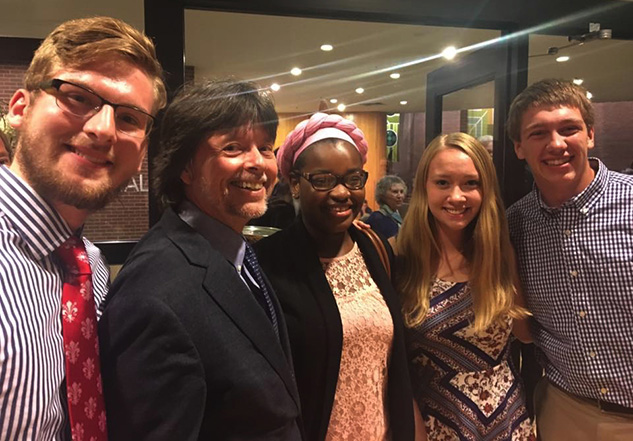
At the end of August we’ll be inviting to campus the fourth cohort of Social Science Scholars. There’ll be 19 fabulous new students. Sixteen hail from Michigan, including our third Yooper and our first student from Lansing. Two of our new Scholars are joining us from Illinois and one is from Missouri. We’re looking forward to welcoming them all to MSU and to the Scholars Program. This cohort brings the tally of current Scholars to 74! It’s amazing to think that just four years ago virtually no one (myself included) knew anything of the plans to create a flagship social science program here at MSU. Now we’re at the forefront of a growing movement in US colleges to invest in those special students who have the ability, maturity and drive to make the very most of their college years.
This newsletter contains brief articles by Scholars who recently completed their first year in the program and the reflections of one of our many valued community partners, Ann Parker. But, first, here are some highlights from the past semester:
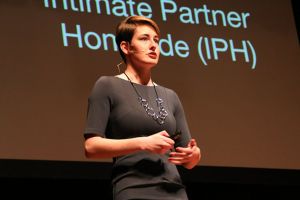
- In April Dean Croson hosted a wonderful event at Cowles House to celebrate the graduation and the many accomplishments of four of our Scholars;
- Tristyn Walton, a senior Scholar, not only achieved the extraordinary accolade of being a finalist for a Truman Fellowship but she also won the college’s Humanitarian Award;
- Madge MacLean (left), also a senior Scholar, received the college’s Undergraduate Research Award and put in a spectacular performance as a presenter at the Wharton Center’s TEDxMSU; and
- Najma Muhammad, a freshman Scholar, was elected to the General Assembly of ASMSU, the university’s student government.
This list could be extended for several pages, but I’ll stop now so that you can hear from some of the students themselves.
A final word: the Scholars Program simply could not give students so many opportunities without alumni and friends offering their time and wisdom. If you’re willing to mentor a Scholar or provide an internship opportunity, we’d love to hear from you. It’s also profoundly important to us that we’re able to support highly able and dedicated students for whom study abroad and unpaid internships would otherwise be out of the question. If you can make a donation, we will ensure that it makes a difference to a student who will repay your generosity through his or her dedication to the missions of the Scholars Program and the university. Thank you to all of you who have already contributed to this unique endeavor.
The Real Freshman Fifteen
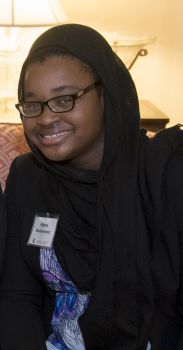
Najma Muhammad - Economics/Horticulture - 2016 Cohort
I am a Black Muslim woman from Detroit, Michigan. For this reason, in almost every social circle I have known, I have been different. So, of course, I did not expect that to change upon my entry into college at MSU. My freshman year confronted me with a lot of difficulties: my average day was at least 15 hours between classes, work, studying, and meetings, and I had to quickly learn how to balance my academic life with my social life. However, that did not stop me from becoming involved on campus. I’m unlike the average student in many ways. My idea of fun is not always parties on the weekends or hanging out with large groups of people. For me, fun was helping to plan Cultural Remix, participating in a Fashion Show hosted by Alpha Phi Alpha Fraternity Inc., going on a study abroad to Mexico with the IEM program, spending lots of time in the library, and having one good friend to eat with on a weekly basis. During the first semester, it took me a while to find my footing. But, with the help of my mentors and advisors, it came easier than I expected. I think one of the many lessons I learned this year is to use available resources and to surround oneself with the right people who will help you head in the right direction. The Social Science Scholars Program offered another level of opportunities. I met and spoke with many amazing people, including the well-known documentary filmmaker Ken Burns (pictured above) and the award-winning African American writer Ta-Nehisi Coates. I especially enjoyed the opportunity to be part of a small Q & A session with Coates during which I asked questions about his learning style and his approach to writing. The Social Science Scholars Program has also given me the opportunity to conduct research with an academic mentor, Dr. Jennifer Cobbina of the School of Criminal Justice. Dr. Cobbina works on issues related to race and crime. She has been amazing, and our relationship continues to grow. I will now be doing research on the many ways in which social media shapes modern social protest movements. I received another mentor through the program, Dr. Eunice Foster, a professor of crop physiology, who had a great impact on my first year. She introduced me to Minorities in Agriculture, Natural Resources and Related Sciences, a national non-profit organization that she assisted in creating years ago, and which empowers minorities in the fields of agriculture, natural resources, and related sciences.
As I began to become more comfortable academically I began to think of ways that I could become more socially at ease. Being at a predominantly white institution after being raised in Detroit my entire life where people of color are a great majority, the transition caused a bit of a culture shock. Given the incidents about which I had heard from other black students, the first-hand micro-aggressions I experienced, and a number of other issues that surfaced on campus during my first semester, I was uneasy about my transition to college life. But, instead of just watching things happen, I decided that I wanted to be on the front line of the action. So, I decided to become an Intercultural Aide in the dorms and participate in student government as one of three representatives for the College of Social Science. I will be serving in these capacities during the 2017-18 school year. As an Intercultural Aide, I will be leading weekly multi-racial roundtable discussions with a group of my co-workers, as well as performing community service and outreach both to low income first generation college students like myself and international students. As a representative for my college I will sit in General Assembly meetings and possibly pass bills to help improve the everyday experience of students. I also found plenty of other activities that have proven to be very enjoyable: working at Student Organic Farms, participating in Black Student Alliance and the Muslim Student Association, being an active member of Minorities in Agriculture, Natural Resources and Related Sciences, and so much more. After a busy, demanding, but also rewarding first year, I am excited about heading off to the UK for a study abroad in July and embarking on my career as a sophomore.
Brett Binkowski, History, 2016 Cohort
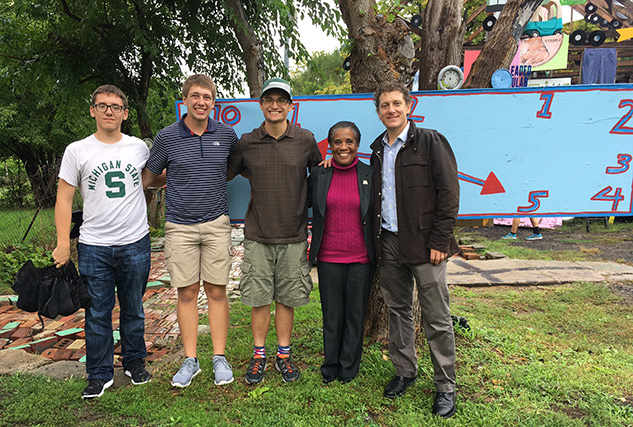
Brett Binkowski (left) with other Scholars Charlie Booher and Alex Lafler, along with Director John Waller and mentor Jennifer Wallace at the Heidelberg Project in Detroit.
When Dr. Waller told the class during our first week of college that we would all need to find a research project, I was clueless about what I should do. What burning question called for me to add my voice in answering it? The answer to this came to me in my introductory African History class when I learned about the stories of Ethiopia and Eritrea.
Like most countries in Africa today, the modern state of Eritrea came out of the remains of a former European colonial regime. For centuries, that region along the northern coast of the Horn of Africa was a collection of provinces within the Ethiopian Empire, possessing a long shared Ethiopian history. The very word “Eritrea” did not even exist in the people’s vocabulary until the Italians arrived in the late 1800s, carved some territory out of Ethiopia’s northern lowlands, and arbitrarily slapped the name on it. After Italy lost control of its colonies in the Second World War, a brief period of British administration followed. In 1953, the age of European colonial rule in Eritrea came to an end. Under a United Nations resolution, Eritrea was returned to being a part of the Ethiopian state. However, this development was not greeted by rejoicing at the reunification of Ethiopian peoples, but rather by decades of Eritreans fighting a war of independence until 1991. The experience of colonialism, and all that subsequently followed, was in the end so transformative that the very self-perception of the various peoples of the former colony shifted: they no longer saw themselves as “Ethiopians” but as a separate “Eritrean” people.
What my research seeks to understand is why this is the case. A population had developed a new national identity—one that they were willing to die for—in accordance with what we might consider to be an artifact of colonialism rather than conforming to what had been for centuries a pre-existing national identity. Especially pertaining to the Middle East and Africa, there is much discussion as to how “authentic” these post-colonial nation-states are, and to what extent these countries are actual “nations” in which the peoples inhabiting them share a sense of identity with a territorially bounded community. The blatant redrawing of borders has even been proposed in recent years on the basis of the logic that the better matching of territories with ethnic, linguistic, religious, and/or “historical” dividing lines would promote more cohesive, stable nation-states. According to this reasoning, however, this action of having Eritrea reabsorbed into Ethiopia—its historical ruler—should have ushered in peace and greater prosperity. It did not. Considering this, understanding cases such as that of Eritrea is becoming more relevant than ever.
In terms of where I have gone with this research so far and where it is taking me, I often laugh when I realize that what started as a casual discussion with my Ethiopian history professor has morphed into quite the passion project. Already, this undertaking has introduced me to a rich literature in a field that I did not even know existed before: Nationalism and Identity Studies. Beyond this, I have been tackling (and continue to tackle) a daunting stack of books on Ethio-Eritrean history as well as a long list of old magazines published by the different branches of the Eritrean Liberation Movement that had never been checked out of the MSU library before. I certainly would be lying were I to claim that managing this all has not been an intimidating challenge (which is itself an understatement)! The crowning gem of this project, however, will be its incorporation of oral history. When I told the aforementioned Ethiopian history professor, Dr. Tibebe Eshete, about this project, he began guiding me and putting me in touch with members of the Eritrean refugee community here in the cities of Grand Rapids and Lansing. On May 20th, Dr. Tibebe and I made our first trip to Grand Rapids to interview members of the Eritrean community (including some former liberation fighters) to provide real substance to my understanding of why everyday people fought and what being an Eritrean means.
While I would describe my experience of being in a room of people who preferred to speak to each other in Amharic and Tigrinya, rather than to me in English, as one of serious culture shock, a comment one of the interviewees made reminded me of how ironically rewarding this discomfort was: “I am impressed to see someone so young so interested in understanding topics such as this.” This research has certainly been more than I expected to be doing in my first year of college, and has more than produced its share of drowning feelings, but that is why it has been such an opportunity for growth, for it is while you are drowning that you learn how to swim!
Ryan Panczak, Economics, 2015 Cohort
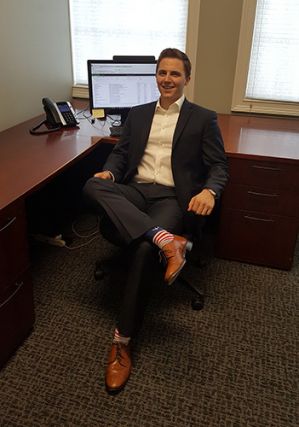
At the beginning of sophomore year, there’s a lot of pressure on a student to find an internship for the upcoming summer. The process can seem overwhelming at times. At some points it can even feel hopeless, but it is important to keep at it. From September to April, I applied to what must have been over twenty different firms for internship positions and had close to ten interviews. In some cases, I swore there was no chance I’d get an interview, but somehow I did. Other times, I walked out of interviews with confidence but nothing to show for it. One of the chief difficulties I faced lay in securing an internship in finance before I had completed the Econ courses that many firms consider to be imperative. One positive I took from the experience was all the practice I was acquiring in interviewing skills. Any time you can land an interview is an opportunity to get better and to make your story and answers to the usual questions more succinct.
Another vital part of the process of applying for internships is a well-formatted resume that presents your attributes and experiences in the best light. Use as many of the career resources (MSU offers tons of them) that you can. With help from Scholars advisor Jenn Arbogast, the Econ scholars program, and Career Services, I managed to fix up quite an ugly resume into a document I am confident in when I apply for jobs.
A major portion of securing your first internship, when many require prior experience, is networking. Reaching out to anyone and everyone you can and bolstering your professional network can lead to a plethora of opportunities. However, it is important to maintain relationships throughout your professional life, not just reaching out when you need something. This will make calling on contacts for favors and advice much easier and fruitful. Extensive networking is how I landed my sophomore internship.
This summer I am working for Mr. Rick Greene’s firm, Greene Wealth Management, as a finance intern. After striking out for months at other firms, I leveraged my network (by network, I mean Dr. Waller) to meet with Rick and discuss the possibility of a summer internship with him. After some interview-like meetings with him and his staff, I was offered a spot at GWM for this summer. I will be working with their model portfolios, trading, as well as spearheading projects that involve integrating new technologies into the business to attract new clients and help service those we already have. I am very excited at the breadth of experiences I will gain this summer, and am glad that my hard work paid off. Be persistent and your qualifications will eventually land you in the right position.
Megan Jursch – Granting New Scholars a Great Experience
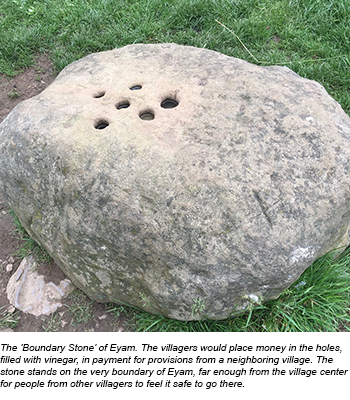
The village of Eyam lies within the Peak District National Park in Britain. It has a population of under one thousand and its formerly industrial economy has given way to a reliance on tourism. That is not exceptional. Eyam's distinctiveness is found in the events that followed the sudden, devastating arrival of bubonic plague in 1665. The story, as told in hundreds of articles and newspaper stories as well as in a recent bestselling novel, Year of Wonders, describes how the villagers chose to quarantine themselves, risking their own lives but heroically keeping the plague from spreading further afield. Estimates vary, but there is agreement that more than 200 villagers died from the plague. Apparently altruistically, the villagers of Eyam had refused to escape the plague; hence Eyam is considered to be a remarkable village, its occupants sacrificing themselves for the greater good. Such a tale makes for great reading, but it may be too good to be true. Dr. John Waller of the History Department wants to know if the traditional story is accurate as told or if it has been significantly embellished. So, this summer, he and seven undergraduate members of the Social Science Scholars Program (including myself) will be investigating its legitimacy, while studying abroad in the United Kingdom, with the financial support of the College of Social Science and the Provost’s Undergraduate Research Initiative. The group will travel to several major archives in order to thoroughly research the outbreak: including the National Archives at Kew, the London Metropolitan Archives, the Wellcome Institute Library, and the Bodleian Library at the University of Oxford. Group members will also travel to the local record offices of Derbyshire, Staffordshire, Lancashire and Cheshire. We’ll be examining primary and secondary sources on the plague with a few key questions in mind:
- What conventions and rules were already in place in the event of plague outbreaks?
- When did the standard story of the Eyam outbreak begin to be told?
- What difference does it make if the conventional story proves to be unfounded?
Over the course of the summer, the information that we compile will allow us to craft answers to these questions and to evaluate whether Eyam’s claim to fame is based in fact. In the fall, we will write up and submit the results of our inquiry to an academic history journal.
Nicole Jedding, Psychology/Public Policy, 2016 Cohort
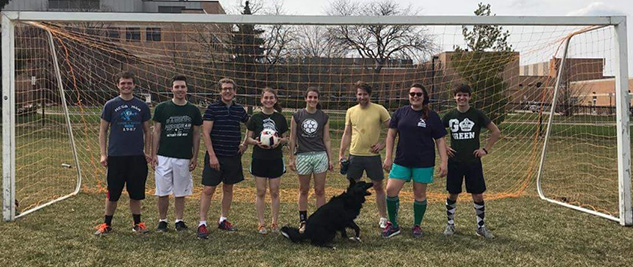
My freshman year at Michigan State was infinitely more fun and rewarding because of my involvement in the Social Science Scholars program. Foremost, I was privileged to befriend and spent copious amounts of time with the awesome people in my cohort as well as the two older cohorts. Whether it was grabbing lunch with a second year Scholar to talk about my schedule, baking cookies with my third year mentor, or hanging out and playing tennis with a fellow first year, I have greatly enjoyed the feeling of inclusiveness and camaraderie that the Scholars program provides. There's also a group of us from all the cohorts, including Dr. Waller and occasionally some of our mentors and other various Social Science faculty, who get together and play some pickup soccer almost every week. Our program does a fantastic job at balancing the fun aspects of a social club with the academic prestige and opportunities of an honors society. Outside of Scholars, I've joined a number of intramural soccer teams, including winning second place in the Spartan World Cup with some friends, attended events for speakers such as Ken Burns and Ta-Nehisi Coates, and experienced Spartan Basketball and Football simultaneously at its best and worst in their student sections.
Speaking on the academic aspects, my research with my group through the Scholars program centers around artificial intelligence in mental health diagnostics. More specifically, my portion of the paper is analyzing why people are more honest with computers than with human physicians and discussing how this can be useful in an age of understaffed health practices where there is often insufficient time and resources to handle the needs of their communities. As a psychology and public policy major, this research is of particular interest to me and my future career. It represents just one application of how new technologies can help solve a problem that affects not only individuals on a psychological level, but also can affect how we structure our healthcare laws and how we can best serve our communities. Working closely with Dr. Heather McCauley and Dr. Andrea Wittenborn, faculty in the MSU Department of Human Development and Family Studies, has actually inspired me to declare a minor in bioethics to help focus my interests in the medical realm of policy and mental healthcare. My group members, Yena Berhane, Qi Huang, and Kyle Jones, and I presented our initial findings at the University Undergraduate Research and Arts Forum on campus in April. Or course, these opportunities were only available to me because of the Scholars program, and Dr. Waller has been a monumental aid in helping us navigate the process. Overall, I’ve had a fantastic year, and I've been incredibly blessed to have met so many wonderful friends and mentors and been given the chance to accomplish and experience many amazing things.
Ann Parker, MSU Alumna and Scholars Mentor
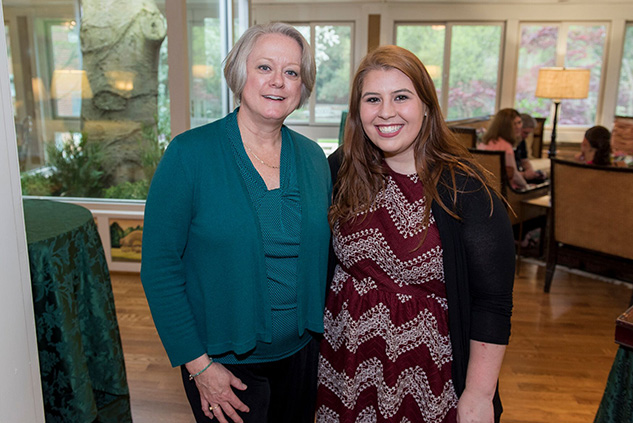
Social Science alumna and Scholars mentor Ann Parker celebrated the graduation of Social Science Scholar Rylee Brower at an event at Cowles House. Rylee, among the first four Scholars to earn their degrees at MSU with the help of mentors like Ann,graduated with a degree in Psychology and begins graduate school at Northwestern in the fall.
It was all a grand experiment that I was pleased to be a part of. The Social Science Scholars program provides students access to a specialty niche program that includes publishing research, service learning opportunities, study abroad and a close-knit cohort with which to enjoy the experience.
How does mentorship fit in? I wasn’t clear myself initially as I embarked on mentoring two young women in the first cohort. They were way more focused and driven than I remembered being at that age. What could I possibly offer?
Mentorship takes different forms from simply being a listening ear, to making introductions to people and places that may result in an internship, a source for research or to help with job placement upon graduation. I tried to offer the two students I mentored, Rylee Brower and Madge MacLean, experiences that would help to enrich their campus experience. Rylee (who, by the way graduated in three years) and I took in an MSU women’s basketball game and saw Kristin Chenoweth in concert at the Wharton Center. Madge McLean and I also spent time there to see Motown the Musical and I couldn’t have been more impressed the night I saw her deliver a Ted Talk on that same stage. There also might have been a trip or two to the MSU Dairy Store and a celebration dinner at Beggar’s Banquet at the end of freshman year.
There are also other organized events for all mentors and mentees like bowling at the Union and skating at Munn Ice Arena. There are other opportunities for just the adults to share experiences and ideas to help all the students in the program.
Consider supporting the College of Social Science and this unique program by getting involved as a mentor. You will find it rewarding and gratifying!

